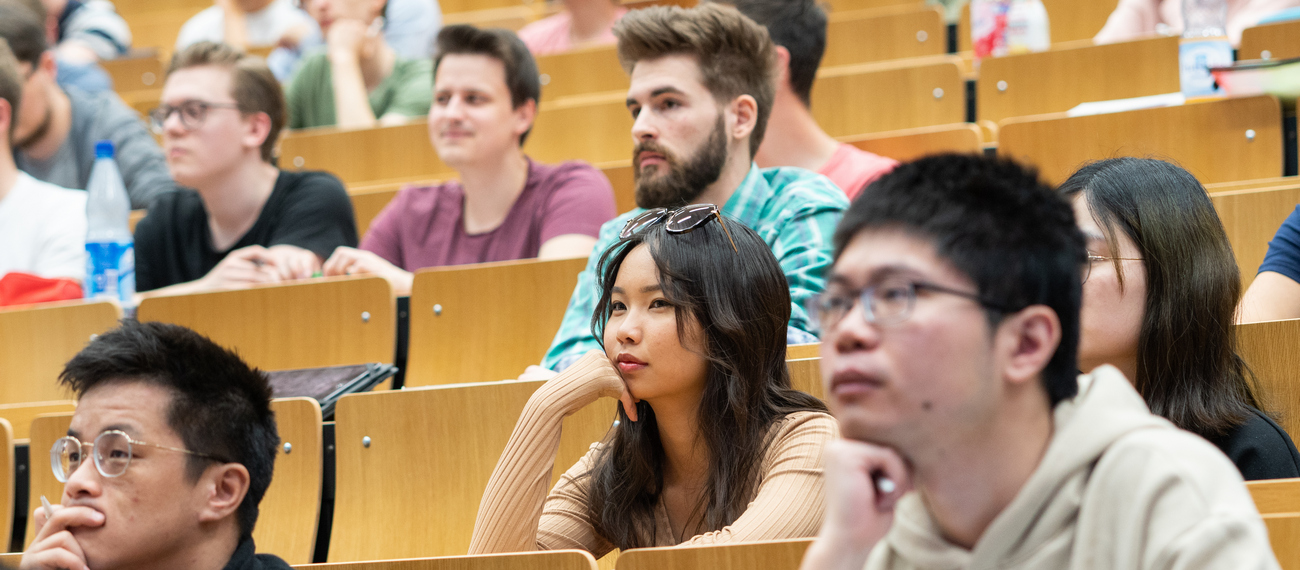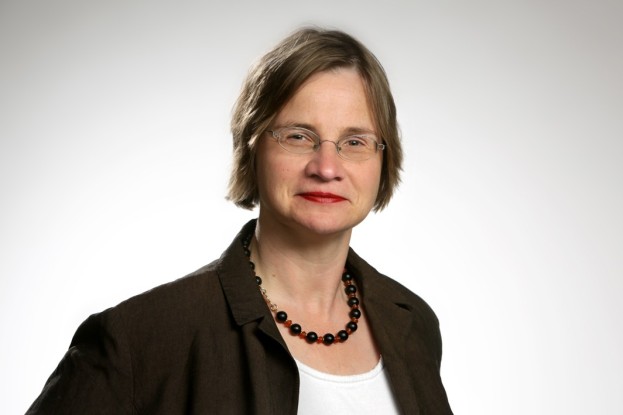Specialisation Options in the Master’s Programme in Mathematics Minimum Set
In the following, you will find the concrete planning for courses at specialisation level. The Master’s seminars in the respective specialisations will always be scheduled so that they do not clash but are not included here for space reasons. The same is true of the relevant core modules in the Bachelor’s Programme in Mathematics.
Please note that details may change.
A complete overview of course planning can be found on this page.
The specialisation courses in the study field Data Science can be found in this table (opens in new tab).
WiSe 2025/26
- Algebraic Geometry II (2+1 en, Richarz)
- Algebraic Topology (4+2 en, Pauli)
SuSe 2026
- Automorphic Forms I (4+2 en, Bruinier)
WiSe 2026/27
- Automorphic Forms II (2+1 en, Bruinier)
Suse 2027
- Algebraic Geometry I (4+2 en, Wedhorn)
- Algebraic Number Theory (4+2 en, Pauli)
WiSe 27/28
- Algebraic Geometry II (4+2 en, Wedhorn)
Requirements for a specialisation in Algebra:
- Attending the third year course “Algebra” resp. courses with similar contents, e.g. in former studies
- The prerequisites for a specialisation in algebra are the following:
- Lang, Algebra, GTM 211, Revised third edition, Springer
- Chapter I Groups: Sections 1 to 11
- Chapter II Rings
- Chapter III Modules
- Chapter IV Polynomials: Sections 1 to 6
- Chapter V Algebraic extensions: Sections 1 to 5
- Capter VI Galois theory: Sections 1 to 7
- Chapter VII Extensions of rings: Section 1
- Chapter X Noetherian rings and modules: Section 1
- Chapter XIII Matrices and linear maps: Sections 1 to 6
- Chapter XIV Representation of one endomorphism
- Chapter XV Structure of bilinear forms: Sections 1 to 8
- Chapter XVI The tensor product: Sections 1 and 2
- Lang, Algebra, GTM 211, Revised third edition, Springer
For additional information visit Algebra.
Are you passionate about algebra? If so, perhaps the Excellence Track in Algebra is for you! Contact Timo Richarz for more information.
The specialisation in Analysis (focus: PDE) comprises two lectures (4+2 each), a seminar and, potentially, other special classes. It can be completed in three semesters. The Research Group guarantees that it will begin in every Summer Semester as well as every Winter Semester. You must have existing knowledge of functional analysis. (It is thus essential to attend the course in Functional Analysis if you want to specialise in Analysis; the relevant course is NOT included in the three semesters mentioned above).
WiSe 2025/26
- PDE I (4+2 en, Stinner)
- Mathematical Modelling of Fluid Interfaces II (2+1 en, Bothe)
- Internet Seminar (9 CP, en, Haller/Egert)
- Stochastic PDEs with applications to climate sciences (2+1 en, Del Sarto)
SuSe 2026
- PDE II (4+2 en, Stinner)
WiSe 2026/27
- PDE I (4+2 en, NN)
- Internet Seminar (9 CP, en, Haller/Egert)
- Parabolic PDEs (2+1 en, Stinner)
SuSe 2027
- PDE II/2 Data Assimilation for Fluid Dynamics (2+1 en, NN)
- PDE II/2 (2+1 en, NN)
- Machine Learning for Fluid Dynamics (2/1 en, Bothe/Maric)
- Mathematical Modelling of Fluid Interfaces I (2+1 en, Bothe)
WiSe 2027/28
- PDE I (4+2 en, Egert)
- Mathematical Modelling of Fluid Interfaces II (2+1 en, Bothe)
- Internet Seminar (9 CP, en, Haller/Egert)
SuSe 2028
- PDE II (2+1 en, Egert)
- Machine Learning for Fluid Dynamics (2+1 en, Bothe/Maric)
- Mathematical Modelling of Fluid Interfaces I (2+1 en, Bothe)
Requirements for a specialisation in Analysis:
- Attending the third year course “Funktionalanalysis” resp. courses with similar contents, e.g. in former studies
- Recommended reading:
- Bühler, Salamon: Functional Analysis, Graduate Studies in Mathematics (opens in new tab), 191. American Mathematical Society. Providence, RI, 2018. Paragraphs 1.1 – 1.3, 1.5, 2 (w/o 2.4.4), 3.1 – 3.2.1.
For additional information visit Analysis.
WiSe 2025/26
- Riemannian Geometry (4+2 en, Große-Brauckmann)
SuSe 2026
- Specialisation Geometry (4+2 en, Reif)
- Mathematical General Relativity Theory (2+1 en, Große-Brauckmann)
WiSe 2026/27
- Specialisation Geometry (4+2 en, Reif)
A sprecialisation in Geometry is not expected to be offered again after the winter semester 26/27.
Requirements for a specialisation in Geometry and Approximation:
- Attending the third year course “Differentialgeometrie” resp. courses with similar contents, e.g. in former studies
- Recommended reading:
- do Carmo, Manfredo P.: Differential geometry of curves and surfaces, Dover 2016, relevant are Chapter 1 to 4.
- Oprea, John: Differential geometry and its applications, Pearson Education 2007 (or Prentice-Hall 1997), relevant are Chapter 1 to 6.
For additional information visit Geometry and Approximation.
Specialisation lecture courses are offered in four fields of specialisation that can be combined (see this page); specialisation cycles can be started every semester.
WiSe 2025/26
- Finite Model Theory (2+1 en, Otto)
- Advanced Applied Proof Theory (2+1 en, Kohlenbach)
- Algorithms and Symmetry (4+2 en, Schweitzer)
- Directed Graph Structure Theory (2+1 en, Hatzel)
SuSe 2026
- Introduction to Computability Theory (2+1 en, Kohlenbach)
- Computational Group Theory (4+2 en, Schweitzer)
- Specialisation in Logic (2+1 en, Otto)
WiSe 2026/27
- Applied Proof Theory (4+2 en, Kohlenbach)
- Specialisation Logic (2+1 en, Otto)
SuSe 2027
- Specialisation Logic (4+2 en, Otto)
- Computational Complexity (4+2 en, Schweitzer)
WiSe 2027/28
- Specialisation Logic (4+2 en, Schweitzer)
SuSe 2028
- Applied Proof Theory (4+2 en, Kohlenbach)
- Computational Complexity (4+2 en, Eickmeyer)
WiSe 2028/29
- Applied Proof Theory (4+2 en, Kohlenbach)
- Attending the third year course “Introduction to Mathematical Logic” resp. courses with similar contents, e.g. in former studies
- Recommended reading:
- Forster, T.: Logic, Induction and Sets. Cambridge University Press, 234pp., 2003
For additional information visit Logic.
The modules can be taken in any order so that over a period of two years you can complete an entire specialisation in numerics (with or without a Master’s dissertation), irrespective of the semester in which you begin your Master’s programme.
WiSe 2025/26
- Numerics for PDEs with Uncertain Data (4+2 en, Lang)
- Computational Electromagnetics (2+1 en, Schmidt)
SuSe 2026
- Efficient Methods for Data Assimilation (2+1 en, Giesselmann)
- Scalable Linear Solvers for Data Science (2+1 en, Lang)
WiSe 2026/27
- Numerics for PDEs with Uncertain Data (4+2 en, Giesselmann)
SuSe 2027
- Computational Electromagnetics (2+1 en, Schmidt)
- Mathematical Biology (2+1 en, Gerisch)
Requirements for a specialisation in Numerics and Scientific Computing:
- For specialized courses in numerical analysis of the master program, we require knowledge from the preceeding bachelor programm, that compares to chapter 1-7 and 10-14 of the following textbook:
- Endre Süli, University of Oxford, David F. Mayers, University of Oxford: An Introduction to Numerical Analysis, 2003, Cambridge University Press ISBN: 9780511801181
- The content of these chapters are taught at TU Darmstadt in the two German taught modules
- 04-10-0013/de Einführung in die Numerische Mathematik 9 CP
- 04-10-0393/de Numerik gewöhnlicher Differentialgleichungen 9 CP
For additional information visit Numerics and Scientific Computing.
The specialisation cycle in Optimisation, which consists of Discrete Optimisation and Non-Linear Optimisation, can be started in any semester and completed within a year. Moreover, at irregular intervals, additional classes are offered at specialisation level.
WiSe 2025/26
- Nonlinear Optimization (4+2 en, Ulbrich)
- Optimization Methods for Machine Learning (2+1 en, Pfetsch)
- Online Optimization (2+1 en, Disser)
- Numerical Methods for Optimization with PDEs (2+1 en, NN)
SuSe 2026
- Discrete Optimization (4+2 en, Pfetsch)
- Geometric Combinatorics (2+1 en, Paffenholz)
- First-order methods for optimization in data analytics (2+1 en, Ulbrich)
- Optimization in function space (2+1 en, Christof)
WiSe 2026/27
- Nonlinear Optimization (4+2 en, Ulbrich)
- Optimization Methods for Machine Learning (2+1 en, Ulbrich)
SuSe 2027
- Discrete Optimization (4+2 en, Pfetsch)
- Optimization in Data Science (2+1 en, Pfetsch/Ulbrich)
WiSe 27/28
- Nonlinear Optimization (4+2 en, NN)
- Optimization Methods for Machine Learning (2+1 en, Pfetsch)
- Nonsmooth Optimization (2+1 en, Ulbrich)
SuSe 2028
- Discrete Optimization (4+2 en, Pfetsch)
- Geometric Combinatorics (2+1 en, Paffenholz)
WiSe 2028/29
- Nonlinear Optimization (4+2 en, Ulbrich)
- Optimization Methods for Machine Learning (2+1 en, Ulbrich)
- Optimization in Transport and Traffic (2+1 en, Pfetsch)
Requirements for a specialisation in Optimisation:
- Attending the third year course “Einführung in die Optimierung” resp. courses with similar contents, e.g. in former studies
- Recommended reading:
- V. Chvatal, Linear Programming, Freeman and Company (2003) (entirely)
- J. Nocedal and S. Wright, Numerical Optimization, Springer 1999, Chapter 12 to 12.3 (incl), Chapter 16 to 16.4 (incl)
- ADM (Algorithmic Discrete Mathematics) (opens in new tab)
For additional information visit Optimisation.
A specialisation cycle in Stochastics lasting two semesters is offered every Winter Semester.
WiSe 2025/26
- Stochastic processes I (4+2 ger, Aurzada)
- Statistical Theory of Deep Learning (4+2 en, Wichelhaus)
SuSe 2026
- Specialisation in Stochastics (4+2 en, Aurzada)
WiSe 2026/27
- Mathematical Statistics (4+2 en, Kohler)
SuSe 2027
- Statistical Theory of Deep Learning (4+2 en, Kohler)
WiSe 27/28
- Stochastic processes I (4+2 en, Betz)
SuSe 2028
- Specialisation in Stochastics (4+2 en, Betz)
- Mathematical Statistics (4+2 en, Wichelhaus)
WiSe 28/29
- Stochastic processes I (4+2 en, Aurzada)
- Statistical Theory of Deep Learning (4+2 en, Wichelhaus)
SuSe 2029
- Specialisation in Stochastics (4+2 en, Aurzada)
Requirements for a specialisation in Stochastics:
- Attending the third year course “Probability Theory” resp. courses with similar contents, e.g. in former studies
- Recommended reading:
- Durret, Rick: "Probability, Theory and Examples”, 4th edition. Please make sure you not only understand the contents of the following chapters but also do most of the exercises in the book.
- Chapter 1: Measure Theory
- Chapter 2: Laws of Large Numbers; sections 2.1 – 2.5.
- Chapter 3: Central Limit Theorems; sections 3.1 – 3.1 and section 3.9
- Chapter 4: Random walks; sections 4.1 and 4.2
- Chapter 5: Martingales
- Chapter 6: Markov Chains; knowledge of this chapter is not essential, but it would be good to have some ideas about Markov chains.
- Lecture Script of the course “Probability Theory” (opens in new tab)
- Durret, Rick: "Probability, Theory and Examples”, 4th edition. Please make sure you not only understand the contents of the following chapters but also do most of the exercises in the book.
- In the study programme M.Sc. Mathematics a specialisation in Statistics is not possible.
For additional information visit Stochastics.


